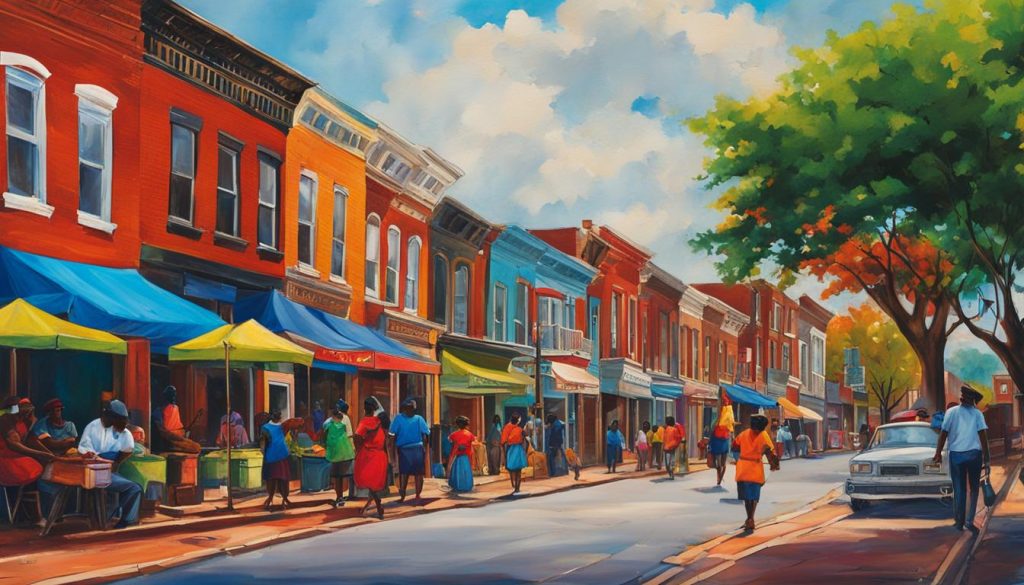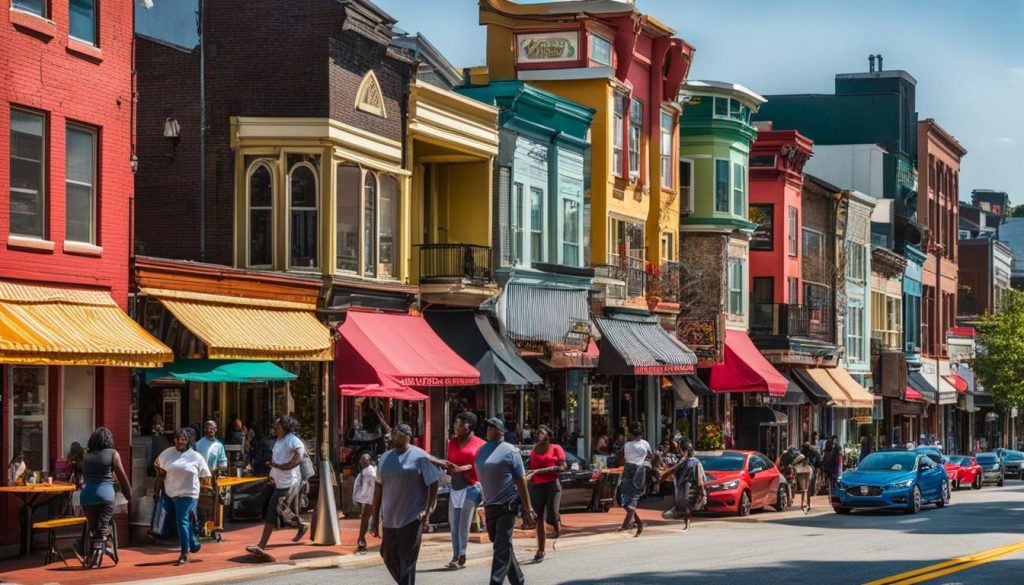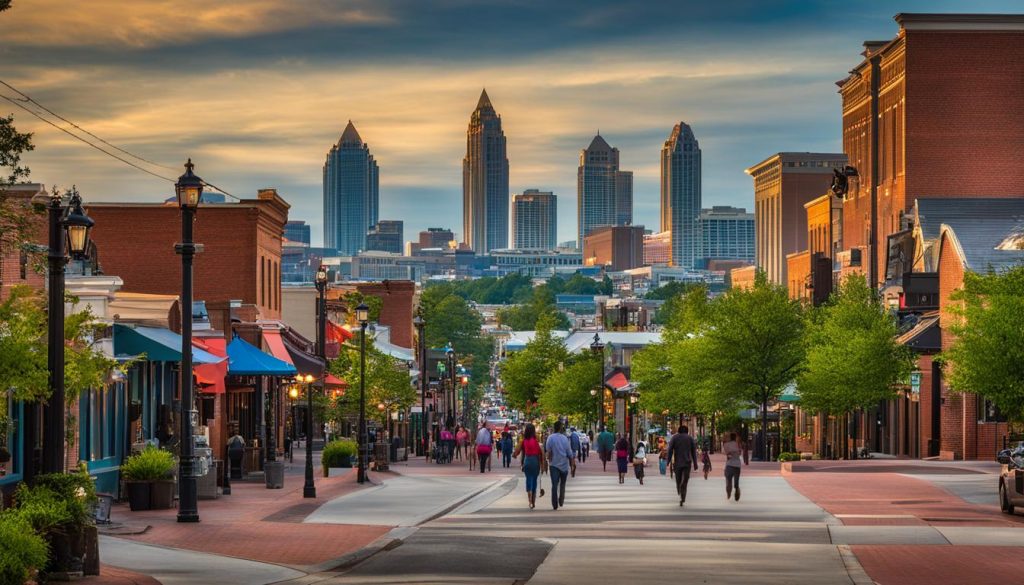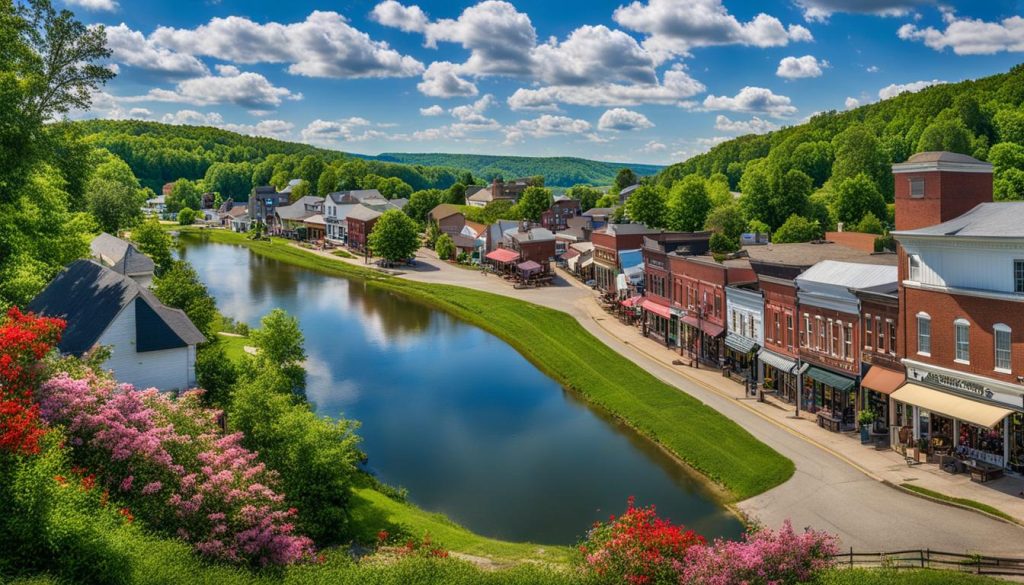When it comes to finding the perfect city for black families in America, there are several factors to consider. From homeownership rates to economic opportunities, it’s important to find a city that provides a supportive environment and a thriving community. In this article, we will dive into the best cities for black families, highlighting the top cities where African-American families can thrive and flourish.
Key Takeaways
- Atlanta, Georgia is ranked as the number one city for African-Americans.
- Washington, D.C. and Baltimore, Maryland also top the list of best cities for black families.
- Southern cities have seen significant black population growth, offering economic opportunities and vibrant communities.
- Some cities face economic challenges and disparities for African-Americans.
- Exploring the cultural heritage, historic landmarks, and culinary traditions of these cities provides a deeper appreciation of the African-American experience in America.
Atlanta: The Cultural Capital of Black America
When it comes to cities that have played a significant role in African-American advancement and cultural enrichment, Atlanta stands out as the undisputed cultural capital of black America. With its thriving music and art scenes, well-established religious and educational institutions, and a strong infrastructure for African-American advancement, Atlanta offers a unique blend of opportunities for black families.
Home to renowned institutions like Spelman College and Morehouse College, Atlanta provides a solid foundation for African-American students to pursue higher education and excel in various fields. The city’s high rate of homeownership among its black population and a median household income above the national average for African-Americans demonstrate the economic prosperity and stability that black families can achieve in Atlanta.
Atlanta’s vibrant music and art scenes are at the heart of its cultural identity. From the birthplace of legendary artists like OutKast and TLC to its thriving hip-hop and R&B scenes, the city has long been a hub for creativity and artistic expression. This cultural wealth provides opportunities for black families to immerse themselves in a vibrant atmosphere that celebrates black talent and achievements.
Table: Key Statistics for Atlanta
| Statistic | Value |
|---|---|
| Median Household Income | $51,701 |
| Homeownership Rate | 44.9% |
| Population Growth | 10.4% |
| Percentage of Black Population | 52.3% |
Table: Key Statistics for Atlanta
Atlanta’s thriving music and art scenes, coupled with its strong educational institutions and economic opportunities, make it a prime destination for black families seeking a vibrant and culturally rich environment to thrive. The city’s history and ongoing commitment to African-American advancement cement its position as the cultural capital of black America.
Washington, D.C.: A Hub of Black Excellence
Washington, D.C., the capital of the United States, is not only a symbol of political power but also a hub of black excellence. With its rich history, diverse culture, and thriving educational institutions, the city offers a strong foundation for African Americans to excel.
The greater Washington, D.C. area is home to Howard University, one of the nation’s top historically black universities. This prestigious institution has been instrumental in shaping the minds of future leaders and has produced numerous prominent figures in various fields. The presence of Howard University attracts talented individuals and fosters a sense of community and intellectual growth.
The city’s black population enjoys a median household income well above the national average, providing economic stability and opportunities for prosperity. Alongside higher incomes, Washington, D.C. boasts high rates of homeownership among its black residents, allowing for the accumulation of wealth and financial security.
With its vibrant cultural scene and diverse neighborhoods, Washington, D.C. offers a stimulating environment for black families to thrive. From the historic U Street Corridor, known as “Black Broadway,” to the vibrant neighborhoods of Shaw and Anacostia, the city is teeming with art galleries, theaters, music venues, and community events that celebrate African-American culture.
Also read: Explore Rich Neighborhoods in Atlanta: Luxury Living Guide
Black Excellence in Washington, D.C.
Strong economic prospects, top-notch educational institutions, and a supportive community make Washington, D.C. a beacon of black excellence. Through the preservation of cultural heritage and the empowerment of its residents, the city continues to foster an environment where African Americans can achieve greatness.
Table: Median Household Income and Homeownership Rates in Washington, D.C.
| Year | Median Household Income (USD) | Black Homeownership Rate (%) |
|---|---|---|
| 2010 | $58,526 | 51.3 |
| 2015 | $75,506 | 48.3 |
| 2020 | $85,203 | 47.5 |
The table above showcases the median household income and homeownership rates among the black population in Washington, D.C. over a ten-year period. Despite a slight decrease in homeownership rates, the median household income has consistently risen, indicating economic progress and improved financial stability for African Americans in the city.
Washington, D.C. offers a strong foundation for black excellence through its renowned educational institutions, economic opportunities, and vibrant cultural scene. It serves as a testament to the achievements and resilience of the African-American community.
Baltimore: A History of Black Achievement
Baltimore, the fourth-ranked city for black families, has a rich history of black achievement. This city boasts the third-highest black median income among the top cities, indicating a thriving economy and ample economic opportunities for African-Americans. With high rates of self-employment, Baltimore demonstrates a strong entrepreneurial spirit within the black community. This creates a supportive environment for black-owned businesses to flourish and contribute to the city’s economic growth.
“Baltimore’s rich history, particularly in the realm of civil rights, adds to its appeal as a city that recognizes and celebrates black achievement.”
In addition to its economic achievements, Baltimore is a city that values and embraces its African-American heritage. With notable figures like Thurgood Marshall, the first African-American Supreme Court Justice, hailing from Baltimore, the city has played a significant role in shaping the course of black history. The Baltimore African American Museum and Cultural Center stands as a testament to the city’s commitment to preserving and celebrating African-American culture and achievements.
Overall, Baltimore’s reputation as a city of black achievement is well-deserved. From its economic opportunities to its rich cultural history, this city continues to be a beacon of success for African-Americans.

Notable Black Achievements in Baltimore
| Category | Notable Achievements |
|---|---|
| Civil Rights | Birthplace of Thurgood Marshall, first African-American Supreme Court Justice |
| Arts and Culture | Baltimore African American Museum and Cultural Center |
| Entrepreneurship | High rates of self-employment |
Southern Cities: A Promised Land for African-Americans
Over the past two decades, the South has emerged as the new promised land for African-Americans, with 13 of the top 15 cities for black families located in this region. These cities, including Raleigh, Charlotte, Orlando, and Miami, have experienced significant black population growth since 2000. The appeal of the South lies in its abundant economic opportunities, lower housing prices, and strong support for business and economic growth.
Economic Opportunities and Business Support
In Southern cities, African-Americans are finding a wealth of economic opportunities. The region’s booming job market, particularly in sectors like technology, healthcare, and education, has attracted professionals seeking career advancement. Additionally, many Southern cities offer robust support systems for entrepreneurship, providing resources and incentives to help black-owned businesses thrive. With a favorable business climate and a growing market, these cities are creating a conducive environment for African-American economic success.
Lower Housing Prices
Another advantage of Southern cities is their lower housing prices, which make homeownership more attainable for African-American families. Unlike some metropolitan areas with soaring real estate costs, Southern cities offer affordable housing options without sacrificing quality of life. This affordability allows black families to invest in their futures and build wealth through homeownership, contributing to the overall growth and stability of their communities.
Thriving Communities
In addition to economic opportunities and affordable housing, Southern cities provide thriving communities for African-Americans. These cities celebrate and embrace diverse cultures, fostering a sense of belonging and unity. African-Americans in the South can enjoy vibrant cultural scenes, access to quality education, and a strong support network. The rich history and traditions of the region add depth and authenticity to the African-American experience in the South, creating a unique and enriching environment for families.
| City | Population Growth | Economic Opportunities | Housing Affordability |
|---|---|---|---|
| Raleigh | 32% | ★★★★★ | ★★★★★ |
| Charlotte | 47% | ★★★★★ | ★★★★ |
| Orlando | 39% | ★★★★ | ★★★★ |
| Miami | 51% | ★★★★ | ★★★★ |
In conclusion, Southern cities have become a promising destination for African-Americans seeking economic prosperity, affordable housing, and thriving communities. The significant population growth in these cities reflects the opportunities and support available to black families in the South. With a favorable business climate, lower housing prices, and a celebration of diverse cultures, Southern cities are providing a promising future for African-American communities.
Struggling Cities: Economic Challenges for African-Americans
While many cities in America offer strong economic opportunities for African-Americans, there are several struggling cities that face significant economic challenges. These cities, particularly in the Rust Belt region, grapple with higher unemployment rates and lower self-employment rates among their black populations. The long-term economic malaise in these areas, coupled with high housing prices in cities like San Francisco and Los Angeles, exacerbates the economic hardships faced by African-Americans.
To better understand the economic challenges in these struggling cities, let’s take a closer look at some key indicators:
| City | Unemployment Rate | Self-Employment Rate |
|---|---|---|
| Milwaukee | 11.7% | 6.5% |
| Grand Rapids | 7.9% | 4.8% |
| Cleveland | 9.8% | 5.1% |
As the table shows, cities like Milwaukee, Grand Rapids, and Cleveland have unemployment rates higher than the national average, indicating limited job opportunities for African-Americans. Additionally, the self-employment rates in these cities are lower, suggesting fewer entrepreneurial opportunities for black business owners.
Addressing these economic challenges requires concerted efforts from both local governments and communities. It is crucial to invest in job creation and entrepreneurship programs that specifically target and support African-American communities. By fostering a more inclusive and equitable economy, these struggling cities can overcome their economic challenges and provide greater opportunities for all residents.
Black-Owned Restaurants and Cultural Heritage in Atlanta

Atlanta, Georgia is not only known for its status as the cultural capital of black America but also for its vibrant food scene that celebrates the city’s rich cultural heritage. With numerous black-owned restaurants, Atlanta offers a gastronomic experience that reflects the diversity and culinary traditions of its African-American community.
Table: Notable Black-Owned Restaurants in Atlanta
| Restaurant | Cuisine | Address |
|---|---|---|
| Paschal’s Restaurant | Southern Soul Food | 180 Northside Dr SW, Atlanta, GA 30313 |
| Busy Bee Cafe | Southern Soul Food | 810 Martin Luther King Jr Dr SW, Atlanta, GA 30314 |
| Sweet Auburn Seafood | Seafood | 171 Auburn Ave NE, Atlanta, GA 30303 |
| Gladys Knight’s Chicken & Waffles | Southern Comfort Food | 529 Peachtree St NE, Atlanta, GA 30308 |
| Old Lady Gang | Southern Comfort Food | 177 Peters St SW, Atlanta, GA 30313 |
One notable establishment is Paschal’s Restaurant, which has become a historic landmark and meeting place for notable activists, entertainers, and politicians throughout its rich history. Located at 180 Northside Dr SW, it has shaped the cultural and social fabric of Atlanta and continues to celebrate the city’s culinary traditions with its soulful Southern cuisine.
“Atlanta’s black-owned restaurants are not just places to eat; they are hubs of cultural heritage, where you can experience the flavors and stories that have shaped our community for generations.” – Local Food Critic
These black-owned restaurants in Atlanta offer more than just a meal; they provide a connection to the city’s African-American heritage, allowing visitors to taste the flavors and experience the stories that have shaped the community for generations.
Historic Neighborhoods and Landmarks in Athens
Athens, Georgia is more than just a city known for its vibrant music scene. It is also home to several historic neighborhoods and landmarks that highlight its rich history and cultural heritage. Exploring these sites allows visitors to immerse themselves in the stories and experiences that have shaped Athens into the city it is today.
Historic Neighborhoods
Athens is home to several historic neighborhoods that provide a glimpse into the city’s past. One such neighborhood is the Boulevard Historic District, known for its beautiful Victorian-era homes and tree-lined streets. This neighborhood has been designated on the National Register of Historic Places and is a popular destination for history enthusiasts and architecture buffs.
The Cobbham Historic District is another neighborhood worth exploring. Known for its well-preserved Greek Revival and Italianate homes, this district showcases the city’s architectural heritage. Strolling through the streets of Cobbham is like stepping back in time and offers a unique perspective on Athens’ past.
Landmarks
Athens also boasts several landmarks that hold historical and cultural significance. The Morton Theatre, built in 1910, is the oldest surviving African American theater in the United States. This landmark has hosted legendary performers such as Duke Ellington and Ma Rainey and continues to be a vital part of Athens’ arts and culture scene.
The Georgia Theatre is another iconic landmark in Athens. Originally built in 1889 as a YMCA, it has since been transformed into a popular music venue. The Georgia Theatre has hosted renowned artists and has played a significant role in shaping the city’s music culture.
Exploring these historic neighborhoods and landmarks is a great way to delve into the rich history and artistic heritage of Athens. Whether it’s admiring the Victorian-era homes in the Boulevard Historic District or catching a live performance at the iconic Georgia Theatre, each experience offers a unique glimpse into the past and present of this vibrant city.
James Brown and African American History in Augusta
Augusta, Georgia, holds a special place in African American history as the birthplace of James Brown, the legendary Godfather of Soul. Discovering the rich heritage and lasting impact of African Americans in Augusta is a journey that should not be missed. The Augusta Museum of History pays tribute to James Brown with an exhibit that explores his remarkable career and lasting influence on the music industry. It offers a fascinating glimpse into the life of this iconic figure and showcases the cultural significance of Augusta in the world of music.
Visitors to Augusta can also take a Black History tour of downtown Augusta to gain a deeper understanding of the city’s African American heritage. These tours reveal the struggles, resilience, and triumphs of African Americans throughout history, highlighting the contributions they have made to Augusta’s cultural fabric. From important civil rights landmarks to stories of local legends and trailblazers, these tours provide a comprehensive overview of the city’s African American history.
“Augusta, Georgia is a place where African American history comes alive. The heritage of James Brown and the stories of the many African Americans who have shaped this city create a profound sense of pride and appreciation.” – Local Historian
To fully immerse oneself in the cultural traditions of Augusta, a visit to the Brunch House of Augusta is a must. This beloved restaurant is known for its homemade Southern breakfast dishes, offering a culinary experience that reflects the city’s cultural traditions. From mouth-watering biscuits and gravy to traditional soul food favorites, this eatery celebrates the flavors that have defined Augusta’s African American community for generations.
Exploring the vibrant history and cultural significance of Augusta in the context of African American heritage provides a meaningful and enriching experience. Whether it’s visiting the Augusta Museum of History, taking a Black History tour, or indulging in the delicious cuisine at the Brunch House of Augusta, each encounter contributes to a greater understanding and appreciation of African American history in this vibrant Southern city.
Gullah Geechee Culture in Savannah
Savannah, Georgia offers a captivating glimpse into the rich heritage of Gullah Geechee culture. The Gullah Geechee people are descendants of West African slaves who settled in coastal areas of the southeastern United States, including Georgia and South Carolina. Their unique culture, with its distinct language, traditions, and crafts, has had a profound impact on the region.
One of the best ways to immerse yourself in Gullah Geechee culture is to visit the Pin Point Heritage Museum, located just outside of Savannah. This museum provides an authentic and educational experience through guided tours and engaging exhibits. Learn about the history and daily life of the Gullah Geechee people, explore their traditional crafts like sweetgrass basket weaving, and gain a deeper understanding of their contributions to American culture.
The Pin Point Heritage Museum offers a window into the lives, struggles, and triumphs of the Gullah Geechee people. It’s a must-visit destination for anyone interested in African American history and the preservation of cultural heritage.
While in Savannah, don’t miss the opportunity to indulge in the culinary delights that showcase the influence of Gullah Geechee culture. Back in the Day Bakery, located in Savannah’s vibrant Starland District, offers a mouthwatering array of pastries that pay homage to Southern baking traditions deeply rooted in African American heritage. Treat yourself to delectable treats like pecan pie, sweet potato biscuits, and peach cobbler, all made with love and a touch of Gullah Geechee flavor.
Exploring the cultural sites, savoring the delicious cuisine, and engaging with the vibrant community allows visitors to understand and appreciate the unique Gullah Geechee culture of Savannah. It’s a journey that celebrates the resilience, creativity, and lasting legacy of the Gullah Geechee people.
Explore the Richness of Gullah Geechee Culture in Savannah
Discover the fascinating history and traditions of the Gullah Geechee people in Savannah, Georgia. The Pin Point Heritage Museum offers an immersive experience where visitors can learn about the significant contributions made by this vibrant community. Don’t miss the chance to savor the culinary delights influenced by Gullah Geechee culture, like those found at Back in the Day Bakery. Immerse yourself in the richness of Gullah Geechee culture in Savannah and celebrate their enduring legacy.
Historical Black Landmarks on Jekyll Island
Jekyll Island, Georgia is home to several significant historical landmarks that highlight the African American experience. These landmarks serve as reminders of the past struggles and contributions of the black community on the island. One notable site is St. Andrews Beach, which holds a salient history as the first public beach in Georgia to welcome African Americans. It served as a gathering place for black performers and musicians, fostering a sense of community and celebration of black culture.
Another important landmark is the Wanderer Memory Trail. This trail commemorates the arrival of enslaved Africans on Jekyll Island aboard the Wanderer, the last known ship to bring enslaved Africans to the United States. The trail serves as a somber reminder of the Middle Passage and the hardships faced by African Americans throughout history. It also symbolizes the resilience of the black community in the face of adversity.
Exploring these historical landmarks provides an opportunity to reflect on the rich and complex history of African Americans on Jekyll Island. It allows visitors to gain a deeper understanding of the struggles, achievements, and contributions of the black community to the island’s heritage. These landmarks serve as important reminders of the ongoing journey towards equality and the need to continue honoring and preserving African American history.
Conclusion
In conclusion, when considering the best cities for black families in America, it is evident that certain cities stand out for their strong infrastructure, economic opportunities, and cultural richness. Cities like Atlanta, Washington, D.C., and Baltimore offer African-Americans high rates of homeownership, self-employment, and median household income above the national average. These cities provide a solid foundation for African-American advancement and have thriving cultural scenes that celebrate diversity and heritage.
Additionally, Southern cities as a whole have emerged as promised lands for African-Americans, with significant black population growth and an abundance of economic opportunities. Cities like Raleigh, Charlotte, Orlando, and Miami offer a lower cost of living, strong business support, and a welcoming community for black families to thrive.
However, it is important to recognize that there are still cities facing economic challenges and disparities for African-Americans. Cities in the Rust Belt region, such as Milwaukee, Grand Rapids, and Cleveland, have higher unemployment rates and fewer self-employment opportunities. Moreover, cities like San Francisco and Los Angeles face high housing prices, making it difficult for African-American families to attain economic stability.
Exploring the cultural heritage, historic landmarks, and culinary traditions of these cities allows for a deeper appreciation of the African-American experience in America. By understanding the strengths and challenges of different cities, we can continue to work towards creating inclusive and thriving African-American communities throughout the country.
FAQ
What are the best cities for black families in America?
According to a survey, the top cities for black families in America are primarily located in the South, with Atlanta, Georgia ranked as the number one city for African-Americans, followed by Washington, D.C. and Baltimore, Maryland.
What factors were considered in determining the best cities for black families?
The survey took into account factors such as homeownership, entrepreneurship, median household income, and demographic trends to determine the best cities for black families.
Why are Southern cities considered a promised land for African-Americans?
The South has seen significant black population growth since 2000, and cities in this region offer economic opportunities, lower housing prices, and support for business and economic growth, making them attractive for African-Americans.
Which cities rank poorly in terms of economic opportunities for African-Americans?
Cities in the Rust Belt region, such as Milwaukee, Grand Rapids, and Cleveland, have higher unemployment rates and lower self-employment rates among their black populations, indicating economic challenges for African-Americans.
Are there black-owned restaurants in Atlanta?
Yes, Atlanta is home to many black-owned restaurants that showcase the city’s rich cultural heritage and offer soulful Southern cuisine. One example is Paschal’s Restaurant, which has been a meeting place for notable activists, entertainers, and politicians throughout its history.
What historic landmarks can be found in Athens, Georgia?
Athens, Georgia is known for its vibrant music scene and historic neighborhoods. The Morton Theatre, Georgia Theatre, and 40 Watt Club are significant landmarks that have played a role in shaping the city’s music culture.
What is the significance of Augusta, Georgia in African American history?
Augusta is the birthplace of James Brown, the Godfather of Soul, and features the Augusta Museum of History, which has an exhibit dedicated to James Brown and his impact on the music industry. Visitors can also take a Black History tour of downtown Augusta to learn more about the city’s African American heritage.
What is Gullah Geechee culture and where can it be explored?
Gullah Geechee culture is a unique African American culture found in the Lowcountry region of the Southeastern United States. The Pin Point Heritage Museum near Savannah, Georgia provides an authentic look into Gullah Geechee culture through guided tours and exhibits.
What historical landmarks can be found on Jekyll Island?
Jekyll Island, Georgia is home to significant historical landmarks that highlight the African American experience. St. Andrews Beach, the first public beach in Georgia to welcome African Americans, has a salient history as a gathering place for black performers and musicians. The Wanderer Memory Trail commemorates the arrival of enslaved Africans and serves as a reminder of the struggles faced by African Americans throughout history.
What are the criteria to determine the best cities for black families?
The best cities for black families are determined by weighing factors such as homeownership, entrepreneurship, median household income, and demographic trends. These factors contribute to a strong infrastructure and economic opportunities for African-Americans.
Source Links
- https://www.forbes.com/sites/joelkotkin/2015/01/15/the-cities-where-african-americans-are-doing-the-best-economically/?sh=734e088e164f
- https://discoveratlanta.com/explore/itineraries/2-days-in-black-owned-atlanta/
- https://www.exploregeorgia.org/black-travel/Georgia-Cities-to-Experience-Black-History



